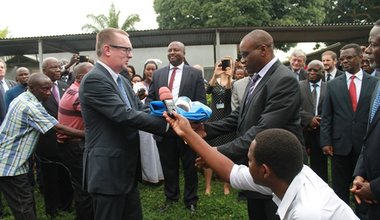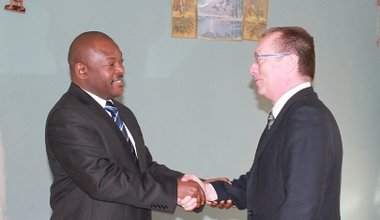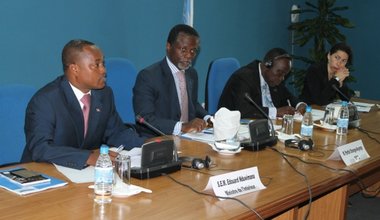SRSG announces meeting in November to monitor electoral workshop road map’s implementation
28 October 2013 – The UN Office in Burundi (BNUB) and Burundian Government will organize a meeting in November to assess the implementation of the road map adopted by all Burundian political parties and actors at the “Electoral Lessons Learned Workshop” of March 2013, the Special Representative of the Secretary General of the United Nations in Burundi Parfait Onanga-Anyanga said.
“Your commitment to do everything to implement March road map recommendations is a strong and very encouraging message. In close collaboration with the Government, we plan to hold an inclusive meeting next month to conduct a first status assessment of the road map 42 recommendations implementation”, Onanga-Anyanga announced on Monday in Bujumbura, at the opening of the second sector-based conference within the framework of Geneva Conference.
Earlier, the President of Burundi Pierre Nkurunziza announced that his Government “will spare no effort in order to implement that waybill as agreed on, and to organize free, fair and transparent elections in 2015.”
While stressing some achievements, the President also admitted that among the major challenges the country has to address are "cases of violations of the human rights" and "cases of political intolerance".
The road map is a 42-recommendation document adopted at the “Electoral Lessons Learned Workshop” organized by BNUB and Burundian Government on 11-13 March 2013. All political parties and actors, including some leaders who were in exile since 2010 elections attended the event.
The road map recommends the adoption of a consensual electoral code to be promulgated no later than December 2013; a consensus on the Constitutional provisions that should be revised before the elections; and “requests the President of the Republic, in accordance with Articles 297 and 299 of the Constitution, to specify the Constitutional provisions to be amended as soon as possible”.
Other recommendations are the drawing up “a calendar for the implementation of the workshop recommendations in close cooperation with the relevant national institutions, Burundian political parties and actors, the United Nations, and international partners” as well as the creation of a conducive security environment for the holding of free and peaceful elections is crucial.
The road map also states that “political parties, actors and coalitions should be able to freely carry out their activities in compliance with the laws in force” while youth affiliated to political parties should “contribute constructively to the establishment of a conductive environment for the elections”.
The Chair of the Peace Consolidation Commission Burundi Configuration, Ambassador Paul Seger, reminded the importance of March workshop with respect to political dialogue but noted « less convincing developments » such us the promulgation of the Press Law and the attitude of youth affiliated to some political parties.
He stressed that the holding of 2015 elections and the establishment of transitional justice mechanisms are among peace consolidation challenges ahead as he invited the Government to accelerate the finalization of the Peace consolidation priority plan 2014-2016.
According to Security Council resolution 2090 which extended its mandate, BNUB should focus on and support the Government of Burundi in promoting and facilitating dialogue between national actors and supporting mechanisms for broad-based participation in political life, including for the implementation of development strategies and programmes in Burundi and towards ensuring a conducive, free and open environment for the run up to the 2015 elections.
 UN
UN





